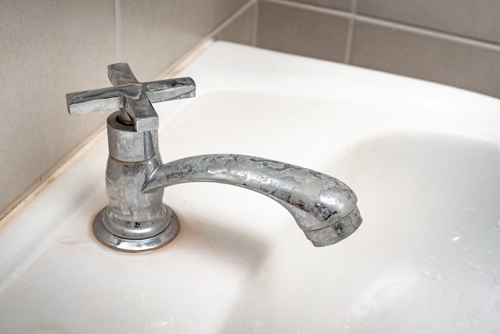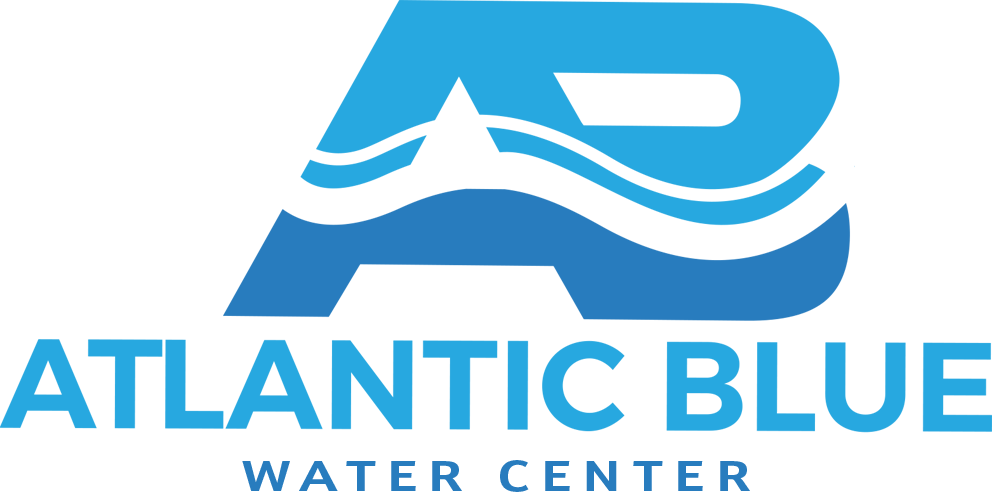Hard water is a problem throughout the country, and while it is not inherently dangerous to consume, it can wreak havoc on your clothing, your plumbing fixtures and your pipes. Before you can test and treat your water, it’s a good idea to understand the facts about hard water at your home. At Atlantic Blue Water Center, we are happy to help guide you through the testing and treatment processes so that your family enjoys water that is clean and safe to consume.
What Is Hard Water?
The term “water hardness” is used to refer to how much dissolved calcium and magnesium are present in water. If the levels of dissolved calcium and magnesium are high, your water is considered hard. If they are low or absent entirely, you have water that is soft. It can be challenging to know if you have hard water or not, especially if you only have a slightly elevated level of hardness.
Water becomes hard as it flows from the surface into aquifers, and along the way, it will absorb minerals like calcium and magnesium. The three levels of hardness are measured in milligrams of calcium carbonate per liter of water:
- Soft Water: 0 to 60 mg/L
- Moderately Hard: 61 to 120 mg/L
- Hard: 121-180 mg/L
- Very Hard: 181+ mg/L
If you want to know your water’s exact hardness levels, work with the team at Atlantic Blue Water Center.
Why Is Hard Water Bad?
Hard water is not an immediate health hazard to you, but it is very harsh on your pipes, your hair and skin, your clothing and your appliances that use water. Hard water makes soaps lather less effectively, which can mean that you spend more on detergents and your clothing still does not feel very clean. Bathing with hard water can leave a film behind on your hair and skin that also makes you feel less clean.
What Are the Signs of Hard Water?
- Water that has a strange taste or smell
- You have brown or reddish-brown stains appearing in the toilet, in the bathtub, in the sink or on other porcelain surfaces
- You have soap scum or white spots on your dishes and glasses even after they are fresh out of the dishwasher
- Your soap is not lathering as much as it used to or you feel like your hair and skin are not clean even after showering
- Your shower heads and pipes are getting clogged more frequently
- Your clothes are experiencing more wear and tear or they are not getting completely clean after washing
- You are getting otherwise unexplained rashes or your family members are experiencing skin issues
- Your appliances that use water, like the washing machine and dishwasher, are wearing out quickly
- There are reports of hard water in your area
Atlantic Blue Water Center can visit your home to complete water testing and determine exactly how hard your water is and if there are other contaminants present that might require filtration to ensure that it is safe for you to consume.

How Can You Fix Hard Water at Your Home?
The most effective way to get rid of hard water problems once and for all is with a water softener. Water softeners are filtration systems that take in the hard water coming into your home and filter out the minerals like calcium and magnesium. These minerals will enter resin beads that are charged with sodium particles and exchange the minerals for the sodium. This process is referred to as ion exchange, and it happens inside of the water softening system.
Softened water is much easier to use than hard water, and it also helps you to avoid the many negative effects of hard water. We can help you to find the perfect water softener for your needs and budget, as well as teach you about the maintenance process. In rare cases, people with low-sodium diets use alternative water softening solutions that do not use sodium in order to reduce their sodium consumption even further. A water softener that does not use salt can transform the minerals in the water into small crystals that are suspended in the water and that cannot attach themselves to pipes and other surfaces like hard water can. We are here to help you in finding the right solution for your home.
Soften Hard Water at Your Home with Help from Atlantic Blue Water Center
We provide water treatment and water softening solutions for homeowners that want a cleaner water supply and water that is free from hazardous carcinogens that can contribute to increased cancer risk. We’re also focused on providing additional education on water treatment, water quality, and issues associated with water contaminants. Call us at (410) 751-9200 to schedule your in-home water testing appointment today.
